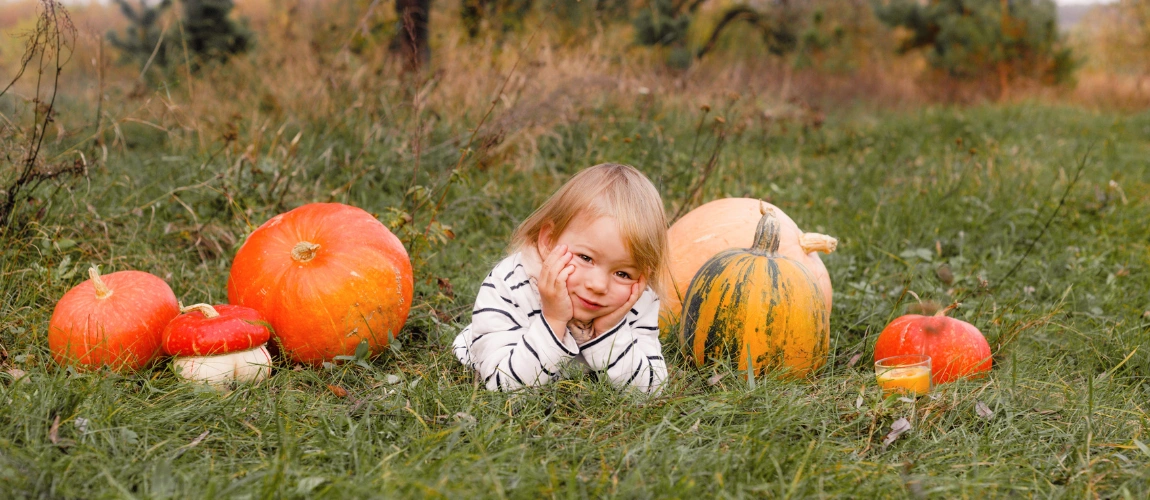Fall is here, and Halloween is coming. Maybe you can smell it in the air, or maybe, like my kids, you’ve been planning your costume since June (literally). Or, maybe that kind of joy is not what you feel as October 31st rolls around.
It turns out that 70% of Americans celebrate Halloween. So, that means that many people celebrate, but certainly not all—nearly one out of every three people don’t. And, it’s not only people who have aged out of the holiday—for many families, the holiday itself doesn’t feel like a match for who they are and what they believe. No matter how you celebrate (or don’t), we see and value you!
Though I never questioned celebrating Halloween as a kid, experiencing Halloween with the wonderfully diverse set of families and educators in our Tinkergarten community has taught me so much—not just about Halloween but about how to stay curious and how to navigate differences with love.
Navigating Strong Reactions
When a topic like Halloween surfaces, I’ve noticed that many people initially dig in and share strong reactions in ardent defense of their positions (we humans are pretty good at that). The range is wide, and the feels about Halloween on all sides can be big.
In so many spaces these days, strongly held positions are the end of it. But, we can't forget that, if we stay curious and open, we can engage in conversations that challenge us, stretch us, and make us think and feel in ways that help us learn how to understand one another better.
Staying Curious
I can recall having one of those same initial reactions about a decade ago in the very early days of Tinkergarten. A teammate, who was very open about why Halloween was not a match for them, approached me with genuine wonder about how we could support all families this time of year. Instead of sticking to my desire to defend the holiday, I listened and leaned in to learn more about what they were worried about.
And they listened, too. They showed respect for my joy for Halloween, and they valued my perspective that the kids I taught and the kids I love had benefitted from celebrations of the holiday. They also opened my eyes to what it could feel like for kids who don't feel comfortable celebrating, who get torn when the way of being in school does not match with the beliefs shared at home, and I was able to see that deep discomfort in a bright, new light.
As a result, we brought other teammates in and broadened our discussion, and this started what has become our ongoing, active and reflective work at Tinkergarten—to figure out how to show up and support all families as we, a diverse community, learn to celebrate times of year in ways that work for everyone. To hold space and recognize that that which brings some of us joy does not bring joy to others—in fact, it may even bring deep discomfort. This messy, wonderful work still includes but reaches far beyond Halloween.
How do we get there?
Just like the Halloween example with my colleague, it starts with taking the time to come together to share and to listen.
Scholar and activist Loretta Ross teaches about how to “call in” instead of call out, and how to engage in productive conversations around differences. She defines a movement not as people who are thinking the same way and moving the same way, but as people who are thinking differently while moving the same way.
At Tinkergarten, we feel like our work is a movement, and we are connected by a shared love of our kids, nature and play. In your community, you might be connected by living in the same neighborhood, attending the same school or just sharing a sense of belonging to the community or region.
From that place of shared commitment, it becomes much easier to explore our differences. We can be both different and united, not around all of our beliefs, but around a powerful shared core or sense of purpose.
Finding Shared Value in Days Like Halloween
First, celebrations, traditions and rituals often have deep connections to the natural world, and they can serve as a way to strengthen kids’ ties to nature, to family and to community—all things we know help kids thrive now and in the future.
Halloween celebrations, in particular, are filled with sensory experiences and pretend play— two super powerful ways to spark wonder in kids and activate young brains for learning. Children’s minds are wired to pretend and operate outside of the literal—and for good brain-building reasons. So, we can all welcome opportunities to help them explore the world through an imaginative lens.
“Imagination is more important than knowledge. Knowledge is limited. Imagination encircles the world.”—Albert Einstein
Checking In & Adjusting as Needed
If you are uncertain, it helps to check with families to make sure that Halloween play, or any celebration context, feels right. For example, I've sent a message directly to each family welcoming them to share with me if/how they would prefer I address holidays like Halloween or birthdays in my classroom. And, to lessen any confusion about why I am asking or fear around speaking up, I make it clear that I am eager to make sure all children feel they and their families are included and reflected in the learning community we create.
If you do not celebrate Halloween, you can share that with families, acknowledging that kids and families may feel very differently, and that you celebrate or hold space for them. You can also share what you will celebrate, drawing from all that the fall season has to offer...which is so, so much!
If a Halloween context concerns or excludes either you or families you work with, you can easily dial down or remove altogether the "Halloween" in an activity while you preserve what makes Halloween so great: the sensory; the pretending; and the sweet. For example, make creature costumes and start to pretend to be kids' favorite animals. Turn "Halloween Brew" into "Surprise Stew." After ten years, we're confident kids will love it just the same.
As you'll see in many of our DIY activities on our site or in our free monthly calendars, we offer ways for grown ups to either celebrate or learn about traditions from around the world. Check out Amazing Apples for an example of how we weave together playful learning and making connections to our diverse community:
- Activity Ideas: Fall marks the start of apple season. We included 7 ways to explore this remarkable fruit!
- Making Connections: Apples also play a special role in holiday rituals like the apples dipped in honey for Rosh Hashanah, the celebration of a new year in the Jewish tradition! Even if you don’t celebrate this holiday, you have the option to spark conversations with your kids about this tradition that is so special in the Jewish tradition.
- Use What Works: Grown ups are also welcome to take inspiration in a way that works for their family! If you want to dive deeper into learning about Rosh Hashanah — go for it! Or, if it’s a better fit, simply try just the apple play ideas.
Where We Are Today
In this October’s edition of our free outdoor play calendar, you’ll see that we share activities that families can choose to connect to either Halloween or Harvest—or just the joy of pretending and playing outside. The calendar also includes call outs for other holidays and days honoring specific traditions and ways of being and believing in the world—celebrations like Indigenous Peoples’ Day and full moons.
And, we will continue to highlight a range of identities, cultures and approaches to celebrating, knowing and being–and we’ll insist on respect for differences and all people in our community.
Difference is a reason for celebration and growth rather than a reason for destruction —Audre Lorde
Curiosity is a Superpower
It’s so important that we can have conversations and hold space for differences— differences in perspective, identity, beliefs, personal experience, and community culture.
We all walk in very different shoes. We don’t all approach our work or lives in the same way, and though that makes moments like Halloween more complicated, curiosity about our differences is real, and it can be a superpower. We just have to remember that we are learning and listening to each other as well as teaching one another. Read more about how wonder and curiosity can help kids, really all of us, become more empathetic.
“Curiosity is the one thing invincible in Nature.” —Freya Stark
Happy October
However you celebrate this October, we see you, value you and welcome you in!

